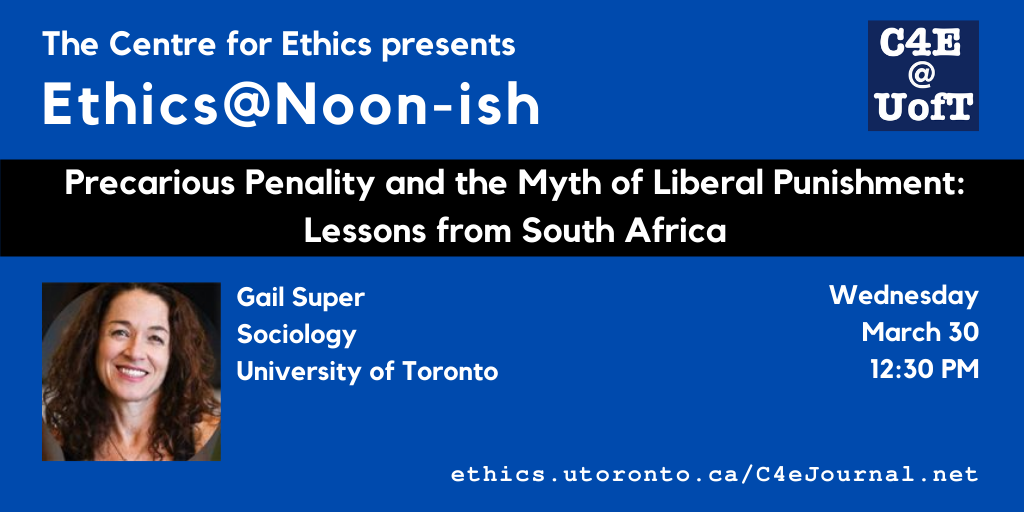
► To stay informed about other upcoming events at the Centre for Ethics, opportunities, and more, please sign up for our newsletter.
Precarious Penality and the Myth of Liberal Punishment: Lessons from South Africa
While liberal law provides that only a judicial officer can impose punishment (during court proceedings, in a certain space, and during specific hours) in practice, the police, prison wardens and civilian actors also punish – but outside of the courts’ spacetime, for different (albeit potentially overlapping) purposes, and in contexts where the protective procedures and principles of liberal law are destabilized. I refer to this as extrajudicial punishment. One of the core arguments I make in this paper is that penal punitiveness cannot be measured through rates of imprisonment alone. This is very apparent in South Africa, where a steep drop in imprisonment rates (from 403 per 100 000 in 2004 to 248 in 2020) has been accompanied by a 2000% increase in prisoners serving life terms, and an increase in recorded cases of extrajudicial penal violence (by inter alia civilians, police officers, and prison wardens). I use the term ‘precarious penality’ to describe this form of penality, where extrajudicial penal violence plays a central role, along with liberal penal forms (such as life imprisonment). The term precarious refers to both the precarity resulting from socio-economic inequality and also to the instability (precarity) of penal forms (for example when a lawful arrest collapses into unlawful violence, or when a lawfully constituted neighborhood watch patrol inflicts extrajudicial punishment). South Africa, with its history of state sanctioned extrajudicial punishment, legal pluralism, and spatialized racism is an obvious example of how precarious and liberal penality interface with, and mutually constitute, each other. Although the discourse of liberal penality centres on the state and its lawful power to punish, in practice extrajudicial punishment (by both state and civilian) actors exists alongside, in the shadow (or underside) of lawful state punishment. Thus, I argue that one cannot discuss extrajudicial punishment without anchoring it in the violence inherent in the liberal state’s penal power. Despite being based on the principles of the Rule of Law, due process, and rationality, liberal punishment is at core exclusionary and unstable. In South Africa, where the boundary between lawful and extrajudicial punishment is blurred and porous, this instability and punitiveness is particularly apparent.
► please register here
This is an online event, available on the Centre for Ethics YouTube Channel, on Wednesday, March 30. Channel subscribers will receive a notification at the start. (For other events in the series, and to subscribe, visit YouTube.com/c/CentreforEthics.)

Gail Super
Sociology
University of Toronto
Co-sponsored by:

Wed, Mar 30, 2022
12:30 PM - 01:45 PM
Centre for Ethics, University of Toronto
200 Larkin
